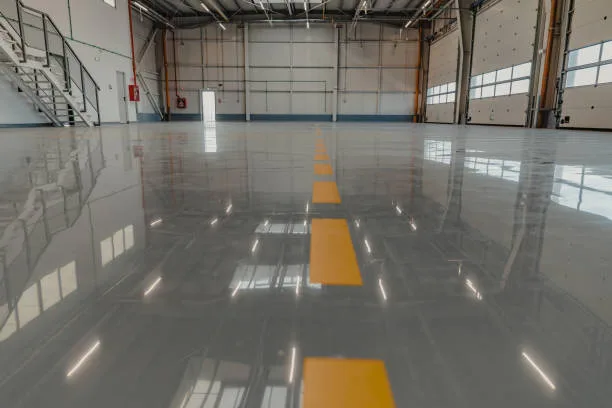
Epoxy flooring has emerged as the preferred choice for industrial applications, and for good reason. This versatile and durable flooring system offers a wide range of benefits that make it the go-to option for a variety of industries, from manufacturing plants to warehouses, laboratories, and more.
In this article, we will explore the key reasons why epoxy flooring has gained such popularity in industrial settings.
The Reasons For The Popularity of Epoxy Flooring in Industrial Applications
1. Durability and Longevity
One of the primary reasons why epoxy flooring is favoured in industrial applications is its exceptional durability and longevity. Epoxy is a thermosetting resin that, when properly applied, creates a dense and seamless surface that can withstand heavy traffic, impact, and abrasion. This makes it ideal for environments where heavy machinery, forklifts, and equipment are constantly in use. Epoxy flooring can handle the wear and tear of industrial operations, making it a cost-effective choice in the long run.
Industrial facilities often require flooring solutions that can withstand exposure to various chemicals and harsh substances. Epoxy flooring is resistant to a wide range of chemicals, including oils, solvents, acids, and alkalis. This chemical resistance ensures that the flooring remains intact and easy to clean, even when exposed to spills and splashes of hazardous materials.
Moreover, epoxy flooring is highly resistant to moisture, making it suitable for environments where humidity levels may fluctuate. Unlike some other flooring options, epoxy does not warp, swell, or deteriorate when exposed to moisture, ensuring that it maintains its integrity over time.
2. Safety and Hygiene
Safety and hygiene are paramount in industrial settings, and epoxy flooring excels in both areas. Epoxy coatings can be customised with anti-slip additives, which enhance traction and reduce the risk of accidents, especially in areas where workers are exposed to slippery conditions or where spills are common.
Epoxy’s seamless and non-porous surface also contributes to a safer and more hygienic environment. Unlike traditional flooring options like concrete, which can harbour dirt, dust, and bacteria in cracks and crevices, epoxy flooring creates a smooth, easy-to-clean surface that prevents the accumulation of contaminants. This is particularly important in industries such as food processing, pharmaceuticals, and healthcare, where cleanliness and hygiene standards are stringent.
Additionally, epoxy flooring is available in a variety of colours, which can be used to create clear demarcation lines, safety zones, and visual cues in industrial facilities. This helps guide employees and visitors and ensures that everyone is aware of potential hazards.
3. Resistance to Wear and Tear
Industrial settings can be incredibly demanding on flooring materials due to heavy equipment, constant foot traffic, and the movement of materials. Epoxy flooring stands up to this wear and tear exceptionally well. Its high compressive strength means that it can withstand the weight of machinery without cracking or deteriorating.
In warehouses and manufacturing plants, where pallets and heavy objects are frequently moved, epoxy flooring maintains its structural integrity. It resists chipping and peeling, ensuring a smooth surface for the efficient operation of equipment and machinery.
Moreover, epoxy flooring can be customised with specific thickness levels to accommodate the unique demands of various industrial settings. This flexibility allows it to meet the needs of everything from light manufacturing facilities to heavy-duty industrial plants.
4. Easy Maintenance
Maintaining flooring in an industrial facility can be a significant challenge, but epoxy flooring simplifies the task. Its smooth, non-porous surface is resistant to stains and easy to clean, reducing the time and effort required for maintenance.
Routine maintenance for epoxy flooring typically involves sweeping or vacuuming to remove dust and debris, followed by mopping with a mild detergent solution. This simple cleaning process keeps the floor looking pristine and minimises the risk of contamination. Epoxy flooring’s resistance to chemical spills also means that any accidental spills can be quickly and easily wiped up without causing damage.
Unlike some other flooring materials that require regular waxing or resealing, epoxy flooring retains its shine and protective properties without the need for frequent maintenance. This not only saves time and money but also minimises downtime in industrial facilities.
5. Aesthetic Appeal
While functionality and durability are paramount in industrial settings, aesthetics also play a role. Epoxy flooring offers a polished and professional look that can enhance the overall appearance of an industrial facility.
Epoxy coatings come in a wide range of colours, allowing facility managers to choose options that match their branding or create a visually appealing work environment. The high-gloss finish of epoxy flooring reflects light, brightening up the space and improving visibility, which can be especially important in manufacturing and assembly areas.
In addition to solid colours, epoxy flooring can incorporate decorative elements such as flakes, quartz, or metallic pigments to create unique and eye-catching designs. This versatility allows industrial facilities to achieve both functional and aesthetically pleasing flooring solutions.
6. Cost-Effectiveness
Epoxy flooring is a cost-effective choice for industrial applications for several reasons. Firstly, its durability and longevity mean that it can last for many years without the need for frequent repairs or replacements. This reduces long-term maintenance costs and minimise downtime for repairs.
Secondly, epoxy flooring’s resistance to chemicals and spills means that it can protect the underlying concrete substrate from damage. Unprotected concrete can deteriorate over time due to exposure to chemicals and moisture, leading to costly repairs. Epoxy flooring acts as a barrier, extending the life of the concrete beneath it.
Furthermore, the ease of cleaning and maintenance associated with epoxy flooring reduces labour costs, as less time and effort are required to keep the flooring in optimal condition.
Lastly, epoxy flooring can be installed relatively quickly, minimising the disruption to industrial operations during the installation process. This can lead to further cost savings by reducing downtime and allowing facilities to resume normal activities sooner.
Conclusion
Epoxy flooring has earned its status as the preferred choice for industrial applications due to its durability, safety, resistance to wear and tear, ease of maintenance, aesthetic appeal, and cost-effectiveness. Whether it’s a manufacturing plant, warehouse, laboratory, or any other industrial facility, epoxy flooring offers a versatile and reliable solution that can withstand the unique challenges of each environment. Its ability to provide a seamless, hygienic, and visually appealing surface while withstanding the rigours of daily industrial operations makes it an essential flooring option in today’s industrial landscape. When it comes to industrial flooring, epoxy is not just a preference; it’s a necessity.




